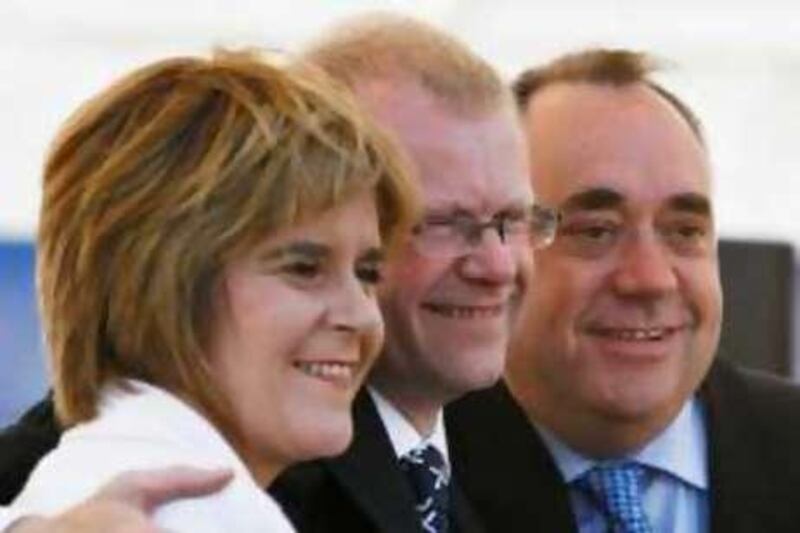LONDON // Gordon Brown starts his family holiday on the Suffolk coast of England today. The weather forecast might be good, but the political barometer has plummeted from dreadful to nigh on catastrophic in the past two days. Even before the Labour Party's astonishing defeat at Glasgow East was declared early on Friday, there were some pretty savage-looking storm clouds gathering on the horizon for the British prime minister.
The Conservatives held a double-digit lead in the opinion polls, Mr Brown's personal standing was the lowest of any postwar leader, and his party had suffered a string of defeats in local council elections - the London mayoral race and the by-election in the supposedly safe Labour seat of Crewe. Then, the unthinkable happened: the Scottish National Party (SNP) overturned a 13,500-vote Labour majority in Glasgow East, until now one of the party's safest seats in Britain, to win Thursday's UK parliamentary by-election by 365 votes.
It was just what Mr Brown - not to mention an increasingly nervous gaggle of his backbench MPs - did not need as he set off for his summer holiday. The embattled leader responded by urging party members to put their confidence in him and his policies, which, he said, would "persuade" voters to back the party before the next general election, expected in about 18 months' time. "Have confidence that not only do we have the right policies but that, when the time comes, we will be able to persuade the British people," he told a gathering of party workers and union officials at Warwick.
Despite the appalling result in Glasgow East, which Mr Brown blamed on the global rise in costs of fuel and food, the prime minister insisted that a "brighter future" lay ahead for Labour. The problem for Mr Brown is that too many of his backbenchers simply do not believe him. Unless there are signs by the autumn of that brighter future being translated into an improving position in the opinion polls, the current, muttered demands for a new leader will inevitably come out into the open.
A leader of one of the country's biggest trade unions, which are the Labour Party's main financial sponsors, has already called for Mr Brown to face a leadership challenge this autumn. Paul Kenny, the leader of the GMB union, told the BBC yesterday that the Glasgow East result was "an unmitigated disaster". "The reality is that people gave a big thumbs down to the Labour Party. If you don't accept that, you've got nowhere to go.
"The MPs have got to make a strong decision as to whether they want to go into an election with Gordon Brown or have a [leadership] contest." Mr Brown, however, does have at least one ace up his leadership sleeve - there is, as yet, simply no high-profile candidate on the radar who could unite the disaffected voices within the party and mount an effective challenge. David Cameron, the leader of the Conservative Party, knows it and, after Glasgow East, challenged Mr Brown to call a general election at the end of the summer. "I think we need change in this country, and that's how change should come about," he said.
Mr Brown, of course, will do no such thing and even went on the offensive over the Conservatives' domestic policy agenda, saying that he did not want "to wake up 24 months from now" to witness Tory cuts in education and health spending to pay for "massive tax cuts" for the rich. But while the Glasgow East result did much to highlight Mr Brown's incredibly fragile position on the UK political landscape in general, it also demonstrated the specific problem of the growing strength of the Scottish Nationalists and the continuing disarray of the Labour Party north of the border.
Last year, the SNP ousted Labour in many of its Scottish heartlands to win control of the Scottish parliament. Since then, the nationalist party has achieved the not-inconsiderable feat of establishing itself as a responsible, mainstream administration in Scotland while, in the UK parliament in Westminster, retaining its renegade, anti-establishment credentials. Much of this is down to the leadership of Alex Salmond, a charismatic figure at the head of the SNP who was as much in evidence during the Glasgow East campaign as John Mason, the actual SNP candidate.
"The theme that John [Mason] developed during the campaign was to send a message to Gordon Brown and to send it in clear and unmistakable terms. That message is - change your policy or change your job," Mr Salmond said yesterday. "This by-election was unique. This was a by-election that was a test of strength between the Labour London government led by Gordon Brown and an SNP government in Scotland doing its best for the Scottish people.
"That was a test of strength that the Labour Party set the timing of. It was in their third safest seat in the whole of Scotland. That was the test of strength, and it was London Labour that was found wanting and the SNP in Scotland that emerged victorious. We now command the agenda in Scottish politics." For once, few people were arguing with Mr Salmond whose prediction a fortnight ago that the SNP would produce an "earthquake" and win the Glasgow East by-election was largely dismissed by political pundits.
Yet Mr Salmond got his earthquake in Glasgow East and, no doubt, Mr Brown will continue to feel the aftershocks during his sojourn in Suffolk. @Email:dsapsted@thenational.ae






